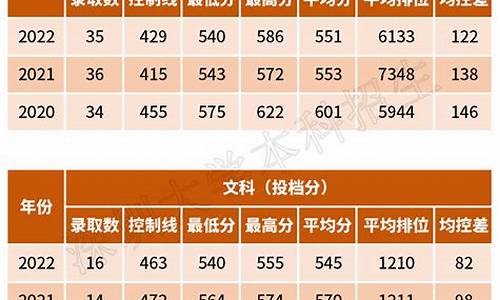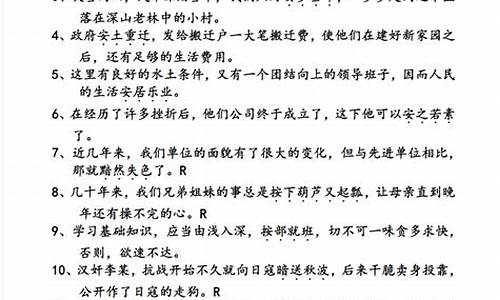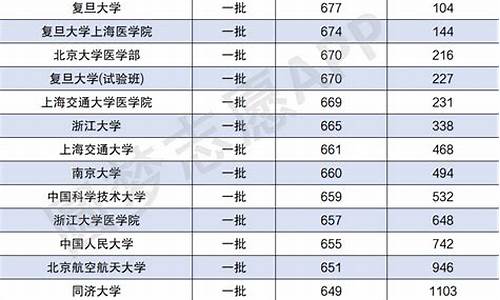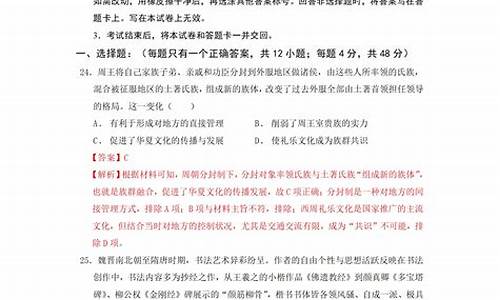高考英语语法知识点总结_高考英语语法知识点总结大全
1.高考新概念英语语法全解之形容词和副词
2.高考英语考点
3.谁知道高考大纲里的所有英语语法知识点呢?
4.高考英语语法填空必背知识
5.高考英语语法:高中英语语法-插入语六大用法小结
6.高考英语语法复习有哪些要点?
7.高考英语语法主要考哪些
8.江苏高考英语知识点
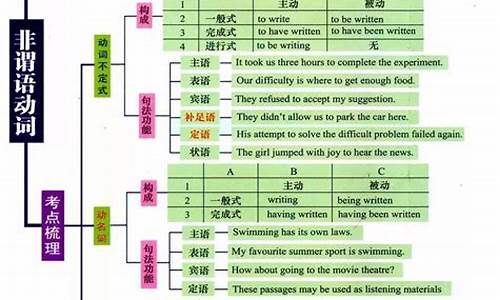
虚拟语气
1.虚拟语气的标准句式
2.标准句式与综错句式
3.条件句的省略倒装
4.虚拟语气的含蓄条件句
介词with, without, under, in, but for 等表示含蓄条件;
连词but, or, or else等表示含蓄条件;
副词otherwise, unfortunately等表示转折假设:
5.省略主句的虚拟语气结构if only
6.用于宾语从句的虚拟语气
that宾语从句需用(should)十动词原形表示虚拟的动词:
advise, recommend, propose, suggest, insist, move, urge, command, direct, order, ask, demand, request, require, maintain, prefer, desire, vote that不可以省略;should可以省略:
以上动词的同词根名词在that同位语从句和表语从句的谓语需用(should)十动词原形
如:
insistence, preference, recommendation, suggestion, proposal, motion, desire, requirement, request, order, necessity
以上动词的同词根形容词及分词在that主语从句的谓语需用(should)十动词原形,如:
advisable, desirable, insistent, preferable, urgent; advised, arranged, commanded, demanded desired, ordered, proposed, recommended, requested, required, suggested; essential, important, natural, necessary, possible, proper, strange
7.用于目的状语从句的虚拟语气 in case; in fear that; lest
8.用于方式状语从句的虚拟语气
9.常用的虚拟语气句式
1) it is high time
2) would rather
3)情态动词完成式可以表示责备、推测语气;
倒 装
全部倒装与部分倒装:
1.否定词语置于句首
never, no, neither, hardly, scarcely, little, seldom, rarely, not until, nowhere, at no time, on no account, in no respects, in no sense, in no way, under no circumstances, by no means, no longer, no less, no more, no sooner, in vain
2. only十状语置于句首
only加副词:only then,only once
only加介词短语:only at that time,only in this way,only by doing
only加状语从句:only because, only when
3.not only……but also……置于句首
4.so……that……状语、表语置于句首
5.than引导的比较状语从句(可以)
6.表语+系动词+主语
7.存在句
8.as引导的方式状语从句(可以)
主谓一致
常出现在主谓部分倒装结构中;常出现在主语与谓语之间有定语从句或其他修饰结构的句子中;常出现关系代词作主语的定语从句中;
1.以-s结尾的名词的主谓一致
1学科名词2构词单复3专有名词
................................................
高考新概念英语语法全解之形容词和副词
#高三# 导语与高一高二不同之处在于,此时复习力学部分知识是为了更好的与高考考纲相结合,尤其水平中等或中等偏下的学生,此时需要进行查漏补缺,但也需要同时提升能力,填补知识、技能的空白。 高三频道为你精心准备了《高三下册英语必修三语法知识点》助你金榜题名!
1.高三下册英语必修三语法知识点
1、现在完成时的标志词
in the past/ last few days/ weeks/ months/ years
(up to) these few days/ weeks/ months/ years
this morning/ week/ month/ year
up to present/ now
so far
till now
since + 时间
2、现在完成时的用法
表示影响或结果
该用法的现在完成时表示一个过去发生的动作在过去已经完成,并且这个动作对现在仍有影响或结果,同时说话者强调的或感兴趣的就是这个影响或结果,如汉语说“他已离开这个城市了”,其中的“离开”肯定发生了,它对现在的影响或结果就是“他现在已不在这个城市了”;
又如汉语说“有人把窗户打破了”,显然“打破窗户”这一动作发生在过去,并且在过去已经完成了,但说话人强调的重点是打破窗户对现在的影响——窗户现在仍是破的。
表示持续
该用法的现在完成时表示一个过去发生的动作或开始的状态在过去并未完成或结束,而是一直持续到现在,并且有可能继续下去(也可能到此结束),如汉语说“他在我们学校教书已有30年了”,显然“他在我们学校教书”是从30年前开始,并且一直教到现在,已经持续了30年;
又如汉语说“自上个星期以来他一直很忙”,显然“忙”是从上个星期开始的,并且这一“忙”就一直忙到现在。
2.高三下册英语必修三语法知识点
一、without的基本用法
1、表否定:没有,无,不需。例:The letter was posted without a stamp.那封信没贴邮票就寄出去了。
2、 用在no, not, never等否定副词之后,强调肯定。没有……不,没有……则不能……,每……必定……。例:You can't get rich without taking risks.人不冒险不富。
3、与-ing形式连用:不,无,没。例:She entered the room without knocking.她没敲门就进了房间。
4、表条件:若无,若非。例:I don't like to go to a country without knowing something of the language. 我要是不懂得一点那个国家的语言,就不想到那个国家去。
5、作表语:without引出的介词短语通常用作状语,但有时也可用作表语。例:She is completely without shame.她恬不知耻。
二、without双语例句
Without you, there would be no me.
没有你们,就不会有我的今天。
Without it, we cannot do anything.
没有它,我们不能做任何事。
His world without her, her world only him.
他的世界没有她, 她的世界只有他。
3.高三下册英语必修三语法知识点
the number of用法及例句
the number of…意思是“……的数字/数目”,介词of同其后名词构成介词短语,修饰the number.当它作主语时,谓语动词用单数。
1、The number of business failures has risen.
企业倒闭的数量增加了。
2、The number of independent firms decreased from 198 to 96.
独立公司的数量从198个减少到了96个。
3、The drug increases the number of red cells in the blood, enhancing oxygen uptake by 10 percent.
这种药增加了血液里的红细胞数量,从而将摄氧量提高了10%。
4、The number of unemployed people in Poland has grown by more than a quarter in the last month.
上个月,波兰的失业人数增长超过了1/4。
5、After eleven days of growth the number of sprouts was counted.
经过11天的生长后,对新芽的数量进行了计数。
4.高三下册英语必修三语法知识点
1、以单数名词或代词、动词不定式短语作主语时,谓语动词要用单数;主语为复数时,谓语用复数。(最基本的)
2、由and或both……and连接的并列成分作主语时,谓语动词用复数。
但并列主语如果指的是同一人、同一事物或同一概念,谓语动词用单数。
3、由and连接的并列单数主语之前如果分别由each, every, no修饰时,其谓语动词要用单数形式。
4、主语是单数时,尽管后面跟有 but ,except, besides, with ,as well as ,together with ,along with,like 等引导的介词短语时 ,谓语动词与前面的主语一致。
注意:主语和谓语之间插入了分词短语,谓语要与主语保持一致。
5、一些只有复数形式的名词,如people, police, cattle, clothes等作主语时,谓语动词要用复数。
6、集体名词family, class, team, group 等看作整体时,谓语动词用单数;看作每一个成员时,谓语动词用复数。
7、 当表示国家,城市,人名,书名,报纸,杂志,及组织机构等的专有名词做主语时,作为整体,谓语动词用单数形式。
The New York Times is reading all over the United States . 《纽约时报》
8、 news ,maths,physics ,politics等词貌似复数,实为单数,其谓语动词用单数.
9、“the +形容词”(如the poor ,the rich ,the young, the old , the dead ,the sick,the brave 等)作主语,谓语动词往往用复数
10、表时间、距离、价格、度量衡等的名词作主语时,谓语动词通常用单数。
11、由连词not……but……, or, either……or, neither……nor, not only…but also,等连接的并列主语,如果一个是单数,一个是复数,则谓语动词按就近一致原则,与最靠近它的主语一致。(这个就是就近原则)
12、There be句型、以here开头的句子谓语动词和靠近的主语一致。
13、a number of后面加复数名词或代词,其动词用复数形式;但the number of后面加复数名词或代词时,其谓语用单数。
14、在定语从句中主语是关系代词who , that , which , 谓语动词的数应与先行词的数一致。
注意在“one of +复数名词+ who/that/which”引导的定语从句中,从句谓语的单复数取决 于one前是否有the (only)、the very。如果有,从句的谓语动词用单数,如没有the only, 就用复数形式。
5.高三下册英语必修三语法知识点
1、my love、my lover
my love意思是我的爱,my lover意思是我的爱人
ove、lover在这里是名词,
love意为爱。my love意思是我的爱
lover意为爱人。my lover意思是我的爱人
2、My Love双语例句
My love will never die.
我的爱始终不渝。
Give my love to Mary when you see her.
见到玛丽代我向她问好。
Take care, my love.
保重,我的爱人。
Please give her my love.
请代我问候她。
My love for you will never die
我对你的爱永不止息。
高考英语考点
形容词和副词
一、考点聚焦
形容词、副词的作用与位置:形容词是用来修饰名词的,常被放在名词前作定语,或放在系动词后面作表语。而副词则用来修饰形容词、动词,其他副词或者句子,一般位于形容词之前,动词之后或
句子之首。
第一节:形容词
1、形容词的定义:形容词简称adv. 形容词简称adv.修饰v. adj.,其他adv.或全句的词,v.,adv.或全句的词修饰v.,adj.,其他adv.或全句的词,表示时间,地点,程度,方式等。表示时间,地
点,程度,方式等。
2、复合形容词的构成
(1)形容词+ 名词+ ed kind-hearted 好心的,white-haired 白发的
(2)形容词+ 形容词red-hot 炽热的,dark-blue 深蓝的
(3)形容词+ 现在分词good-looking 好看的,easy-going 随和的
(4)副词+ 现在分词hard-working 勤劳的,fast-moving 快速转动的
(5)副词+ 过去分词hard-won 得来不易的,newly-made 新建的
(6)名词+ 形容词life-long 终生的,world-famous 世界闻名的
(7)名词+ 现在分词peace-loving 爱好和平的,fun-loving 爱开玩笑的
(8)名词+ 过去分词snow-covered 白雪覆盖的,hand-made 手工的
(9)数词+ 名词+ ed four-storeyed 4 层楼的,three-legged 3 条腿的
(10)数词+ 名词(名词用单数)ten-year 10 年的,two-man 两人的
第二节:副词
什么是副词?
指出句中的副词:
1. You are standing near the camera.. Can you move a little farther? a little修饰副词“farther”表示程度 farther修饰动词“move”表示方式
2. Miss Long usually goes to school by bus. usually修饰动词goes,表示频度、频率
3. The two old passengers fell into the sea. Unfortunately, neither of them could swim. Unfortunately修饰整个句子
4. I won’t go with you. It’s much too hot today. much too修饰形容词,表示程度修饰形容词hot,修饰形容词
高考副词主要考点
主要题型:选择填空,完形填空,改错
考点内容:
1. 副词词义辨析
(10浙江) Do you think shopping online will ____________ take the place of shopping in stores?
A.especially B.Frequently C.merely D.finally
解析:especially 特别,尤其;frequently经常;merely仅仅;finally最终
根据语境:你认为网上购物最终会替代商场购物吗?
(10湖北) I wasn’t blaming anyone; I ___________ said errors like this could be avoided.
A. merely B. mostly C. rarely D. nearly
解析:mostly 大部分地,通常地;nearly 几乎=almost;rarely 很少地,几乎不;merely 仅仅,只不过
全句意思:我并没有责怪任何人,我只是说类似这种错误是可以避免的” 说类似这种错误是可以避免的”。
2. 副词短语与习惯用语辨析
(09全国) It’s high time you had your hair cut; it’s getting .
A. too much long B. much too long C. long too much D. too long much
解析too much+不可数名词 much too+形
(09天津) It was a nice house, but _______ too small for a family of five.
A. rarely B. fairly C. rather D. pretty
解析rather too 稍微,一点
全句意思:这房子不错,但对于五口之家还是稍微小了点
(2011全国)It is one thing to enjoy listening to good music, but it is______another to play it well yourself.
A. quite B. very C. rather D. much
解析quite another 另一回事
全句意思:喜欢听好音乐是一回事,但是自己演奏的好又是另一回事
3. 某些副词的位置
(10辽宁)We only had $100 and that was _______ to buy a new computer.
A.nowhere near enough B.near enough nowhere C.enough near nowhere D.near nowhere enough
辨析enough做副词时,修饰形容词或副词时应该放在被修饰词的后面adj/adv+enough nowhere near是固定短语,意思是“差得远;远不及” ,相当于一个形容词
4. 短文改错题
Unfortunate, there are too many people in my family 此处用副词作状语,修饰整个句子
adv怎么分类?
◆按意义分类1.普通副词 2.疑问副词 3.连接副词 4.关系副词
普通副词可分为以下几类副词
1)时间副词:today今天 yesterday昨天 lately近来,最近 next 下个 如:next Sunday下周日 last…上个 如:last week上周
确切的时间副词可放句末和句首 They talked with Tom about it yesterday. Yesterday They talked with Tom about it.
2)频度副词:always总是usually通常often经常,总是,通常 sometimes 有时 seldom/rarely 很少,有时 never 从不 occasionally 偶尔,间或,从不 constantly时常,不断地 frequently
时常频繁地 行为/实义
之前:①常位于行为实义之前:He seldom goes to the movies. 放在be动词,助动词和情态动词之后:动词 ②放在动词,助动词和情态动词之后:She is always acting like that.
3)地点副词: here 这里 there那里 everywhere到处 anywhere任何地方 inside在里面,往里面 outside 在外面,向外面 upstairs 在楼上,往楼上 downstairs 在楼下,往楼下 常放在谓语V之
后:He went away.
He lived abroad.
4)方式副词: slowly慢慢地 happily幸福地,快乐地 hard努力地,艰苦地 quickly快,迅速地 sadly哀伤地,伤心地 quietly悄悄地,安静地 carefully认真地,小心地 properly恰当地,正确地,
常放在被修饰的V之后
或放在句末 He ran quickly. I can do it well.
5)程度副词: very非常 much非常,很 very much很,非常 quite相当,非常,相当,,很 rather相当 little少so这么,那么,如此 too太 enough足够地,充分地 hardly几乎不,简直不,常放在
被它修饰的adj.,
adv.或v.之前The book is very good. I almost believed his story.
6)语气副词:certainly当然 obviously显然地,当然 besides此外luckily/fortunately幸运地, 此外 unlickily/unfortuntely不幸地 语气副词常放句首,修饰全句,语气副词常放句首,修饰全句,表示强调说明,调说明,或表示说话人的语气和态度Unfortunately, he won't be here tomorrow evening.
adv怎样构成?
1. 本身为adv.:ago, now, often, very等
2. 大多数的adv.由adj.加上后缀ly组成 1)一般情况:slow-slowly, bad-badly 2)辅音字母结尾,y改为i再加ly happy-happily, angry-angrily 3)le结尾去掉e加y: single-singly
3. 有些adv.由介词或地点名词加后缀-ward (s)构成forward(s) backward(s)
4. 与adj同形的adv.:特别是以下几个:enough足够相当 early早, fast快, 足够 deep深地 high高,向高处 hard努力地,艰苦地 late迟到,晚 wide广阔地
5. 加ly变副词后意思发生变化的副词 highly非常,高度地 widely广泛地,非常 nearly几乎 lately近来,最近 hard努力地 hardly几乎不 deeply深深地,深刻地 widely广泛地
某些副词在句中的位置是怎样的?
1.a. enough足够地、十分地The book is _______enough for you to understand. easy _______ 这本书对你来说完全可以看得懂。They cannot walk ______________
_______________. fast enough 他们走得不够快。I'm ______ __________ to handle my own affairs. old enough 我已经长大了,可以处理我自己的事情。 b. enough足够的,
修饰n时也可放在n.后,也可放在n
前:enough money I have ___________ _____________ to buy the book. 我有足够的钱买着本书。enough chairs We have ___________ _____________ for everyone.
我们有足够的椅子让大家坐。
2. a. both, all, often及always等频度副词+实义动词及等频度副词实义动词;b. be动词情态动词助动词both, all, often, always等动词/情态动词助动词+ 动词情态动词/助动词等
are always
They _________ _____________ late for school. 他们总是上学迟到。 are both We ________ ____________ students of No. 14 High School. 我俩都是这个班的学生。all
like They ___________
_____________playing basketball. 他们全都喜欢打篮球。have both finished We_________ ____________ _____________ our homework.我们俩都完成作业了。
3. 几个副词在同一个句子中出现的情况:
1) 谓语v后常出现的副词有表示地点,时间,方式,一般的排列顺序为:程度→方式方式→地点如:时间副词, very hard there We worked _________ ________
__________ later ___________. 我们在那儿工作很努力。We’re going to have a meeting_________________ in the classroom _______________________. this
afternoon 今天下午我们将在教室里开会。
2) 几个时间副词,地点副词作状语时,一般来说时间副词/地点副词作状语时,从小到大排列,如:at five o’clock on the afternoon He was born _________________________ of July 28th, 1994
___________________. 他出生在1994年7月28号下午五点。 I first met Peter _______________________. in a bookstore in Boston 我第一次见到Peter是在波士顿的一个书店里。
以下属几种特殊情况,须牢记:
(1)形容词短语作定语,定语后置。a language difficult to master, a leaning tower about 180 feet high
(2)表语形容词(afraid、alike、alone、asleep、awake、alive 等)作定语,定语后置。如a man alive。有些表身体健康状况的形容词如well、faint、ill 只作表语。sick 既可作表语又可作定语,ill 如作定语意为“bad”。
(3)用作定语,修饰由不定代词one、any、no、some 和every 构成的复合词如anything、something 等时,通常后置。如:I have something important to tell you.
(4)else 常用作疑问代词和不定代词的后置定语。
(5)enough、nearby 修饰名词前置或后置,程度副词一般位于形容词、副词前面,enough 修饰形容词、副词时,必须后置。
(6)几个副词并列作状语时,其顺序较灵活,但一般是:方式→地点→时间。如:We had a good time together outdoors last Sunday.
(7)频度副词如often、always、usually 等在be 动词后,行为动词前。
(8)副词作定语,定语后置。如:The person there is waiting for you.
(9)几个并列的形容词作定语,其语序通常为:限定语(The、A)+ 描绘性形容词+ size (大小)shape + (形状)age + (年龄、时间)color 颜色)origin + (+ (国籍、来源)material + (材料)+
purpose(目的)+ 名词。如:a heavy black Chinese steel umbrella, the man’s first tow interesting little red French oil paitings
(10)以-ly 结尾的词性辨析。①下列单词以-ly 结尾,但却是形容词而非副词:lively、lonely、lovely、deadly、friendly、ugly、silly、likely、brotherly、timely 等。②表愿意
(无-ly)和引申意(有-ly)的副词:
deep 深wide 宽广high 高low 位置低deeply 深入地widely 广泛地highly 高度地lowly 地位卑微③有无-ly 意义大不相同的副词:dead 完全,绝对be dead asleep deadly 非常be deadly tired pretty 相当be pretty certain that… prettily 漂亮地be prettily dressed close 近Don’t sit close. closely 密切地Watch closely! late 晚、迟arrive late, come late lately 最近I haven’t seen him lately(recently).
谁知道高考大纲里的所有英语语法知识点呢?
识在于积累、学习在于思考
1
2015
年高考英语语法单选超级归纳
一、冠词
冠词分为不定冠词(
a, an
)
,定冠词(
the
)
,和零冠词。
I.
不定冠词的用法
1
指一类人或事,相当于
a kind of
A plane is a machine that can fly.
2
第一次提及某人某物,非特指
A boy is waiting for you.
有个男孩在等你。
3
表示“每一”相当于
every
one
We study eight hours a day.
4
表示“相同”相当于
the same
We are nearly of an age.
5
用于人名前,表示不认识此人或与某名人有类似性质的人或
事
—
Hello, could I speak to Mr. Smith?
—
Sorry, wrong number. There isn't______ Mr. Smith here.
A.
不填
B. a
C. the
D. one
That boy is rather a Lei Feng.
(活雷锋)
6
用于固定词组中
a couple of, a bit, once upon a time, in a hurry, have a walk, many a time
7
用于
quite, rather, many, half, what, such
之后
This room is rather a big one.
8
用于
so(as, too, how)+
形容词之后
She is as clever a girl as you can wish to meet.
9
用于抽象名词具体化的名词前
success(
抽象名词
)
→
a success(
具体化
)
成功的人或事
a failure
失败的人或事
a shame
带来耻辱的人或事
a pity
可惜或遗憾的事
a must
必需必备的事
a good knowledge of
精通掌握某一方面的知识
II.
定冠词的用法
1
表示某一类人或物
In
many
places
in
China,
___
bicycle
is
still
___
popular
means
of
transportation.
A. a; the
B. /; a
C. the; a
D. the; the
2
用于世上独一无二的事物名词前
the universe, the moon, the Pacific Ocean
3
表示说话双方都了解的或上文提到过的人或事
Would you mind opening the door?
4
用于演奏乐器
play the violin, play the guitar
5
用于形容词和分词前表示一类人
the reach, the living, the wounded
6
表示“一家人”或“夫妇”
(对比上文的不定冠词用法
5
)
—
Could you tell me the way to ____ Johnsons, please?
—
Sorry, we don’t have ____ Johnson here in the village.
A. the; the
B. the; a
C. /; the
D. the; /
7
用于序数词和形容词副词比较级最高级前
He is the taller of the two children.
8
用于国家党派等以及江河湖海,山川群岛的名词前
the United States, the Communist Party of China, the French
9
用于表示发明物的单数名词前
The compass was invented in China.
10
在逢十的复数数词之前,指世纪的某个年代
in the 1990’s
(
二十世纪九十年代
)
11
用于表示度量单位的名词前
I hired the car by the hour.
12
用于方位名词,身体部位名词
He patted me on the shoulder.
III.
不用冠词(又名零冠词)的用法
1
专有名词,物质名词,抽象名词,人名地名等名词前
Beijing University, Jack, China, love, air
2
名词前有
this, my, whose, some, no, each, every
等限制
I want this book, not that one. /
Whose purse is this?
3
季节,月份,星期,节假日,一日三餐前
March, Sunday, National Day, spring
4
表示职位,身份,头衔的名词前
Lincoln was made President of America.
5
表示球类,棋类等运动的名词前
He likes playing football/chess.
6
与
by
连用表示交通方式的名词前
We went right round to the west coast by ______ sea instead of driving
across ______ continent.
A. the; the
B.
不填;
the
C. the;
不填
D.
不填;不填
7
以
and
连接的两个相对的名词并用时
husband and wife, knife and fork, day and night
知识在于积累、学习在于思考
2
8
表示泛指的复数名词前
Horses are useful animals.
二、
名词和主谓一致
I.
名词的种类
专有名词
普通名词
国名地名人名,团体机构名称
可数名词
不可数名词
个体名词
集体名词
抽象名词
物质名词
特别注意名词类别的相互转换
个体名词与抽象名词的相互转换
例
句
意
义
名词性质
①
She held some flowers in her hand.
②
The trees are now in flower
花儿
个体名词
开花
抽象名词
①
Youth is beautiful.
②
He is a youth of twenty
青春
抽象名词
年轻人
个体名词
①
They have achieved remarkable success in their work.
②
—
How about the Christmas evening party?
—
I should say it was a success.
成功
抽象名词
成功的事
个体名词
物质名词与个体名词的相互转换
例
句
意
义
名词性质
①
Iron is a kind of metal.
②
Please lend me your iron.
铁
物质名词
熨斗
个体名词
①
He broke a piece of glass.
②
He broke a glass.
玻璃
物质名词
玻璃杯
个体名词
①
I bought a chicken this morning
②
Please help yourself to some chicken
小鸡
个体名词
鸡肉
物质名词
抽象名词与个体名词的转换
具有动作意义的抽象名词加用
与某些动词(如:
have
等)连
用,表示某一次短暂的动作
①—
I’d like______information about the management of your hotel,please.
—
Well, you could have____word with the manager. He might be helpful
A.some,a
B.an,some
C.some,some
D.an,a
②
They sent us
word of the latest happenings.
消息
(抽象名词)
A.a
B.an
C./
D.the
③
Could we have
word before you go to the meeting?
话(个体名词)
A.a
B.an
C./
D.the
类例:
have a dream/a rest/a smoke/a swim/a trip/a wash/a discussion/a look
take a walk/a bath
make an advance(
进步
)/make an early start(
早点出发
)
/make a decision/make a change/give a cry of pain(
发出痛苦的叫声
) /give a try
表示知识和时间的抽象名词转
换为普通名词时可以用来表示
其中的一部分
①
Many people agree that___knowledge of English is a must in____international trade today.
A.a,
/
B.the, an
C.the, the
D. /, the
a knowledge of truth(
知道实际情况
)
give a fuller knowledge of China(
提供关于中国更为翔实的知识
)
have a knowledge of shorthand(
有速记的知识
)
②
If there were no examination, we should have______at school.
A.the happiest time
B.a more happier time
C.much happiest time
D.a much happier time
③
is money.
A.The time
B.A time
C.Time
D.Times
抽象名词转换为普通名词可用
来表示“一次、一阵、一种”
具体的行为、事件、现象或结
果。这时名词前往往有形容词
修饰
①
Oh, John. _____you gave me!
A.How a pleasant surprise
B.How pleasant surprise
C.What a pleasant surprise
D. What pleasant surprise
②
She looked up
when I shouted.
A.in a surprise
B.in the surprise
C.in surprise
D.in some surprise
其它例子:
The gift came as a complete surprise to me. We have had some unpleasant surprise
③
It is_____work of art that everyone wants to have a look at it.
A.so unusual
B. such unusual
C.such an unusual
D.so an unusual
II.
名词的数
规则名词的复数形式:名词的复数形式,一般在单数形式后面加
-s
或
-es
(参看有关语法书)
。英语里有些名词的复数形式是不规则的,请
看下表
规
则
例
词
1
改变名词中的元音字母或其他形式
man-men, woman-women, foot-feet, goose-geese, mouse-mice
2
单复数相同
sheep, deer, series, means, works, fish, species
3
只有复数形式
ashes, trousers, clothes, thanks, goods, glasses, compasses, contents
知识在于积累、学习在于思考
3
4
一些集体名词总是用作复数
people, police, cattle, staff
5
部分集体名词既可以作单数
(整体)
也可以作复数
(成
员)
audience,
class,
family,
crowd,
couple,
group,
committee,
government,
population, crew, team, public, enemy, party
6
复数形式表示特别含义
customs(
海关
),
forces(
军队
),
times(
时代
),
spirits(
情绪
),
drinks(
饮料
),
sands(
沙滩
),
papers(
文件报纸
),
manners(
礼貌
),
looks(
外表
),
brains(
头脑
智力
), greens(
青菜
), ruins(
废墟
)
7
表示
“某国人”
加
-s
Americans, Australians, Germans, Greeks, Swedes, Europeans
单复数同形
Swiss, Portuguese, Chinese, Japanese
以
-man
或
-woman
结
尾
的
改
为
-men,-women
Englishmen, Frenchwomen
8
合成名词
将主体名词变为复数
sons-in-law, lookers-on, passers-by, story-tellers, boy friends
无主体名词时将最后一部分变为复数
grown-ups, housewives, stopwatches
将两部分变为复数
women singers, men servants
III.
主谓一致
规则
情
况
举
例
语
法
一
致
原
则
以单数名词或代词动词不定式短语,
动名词短语或从句作主
语时,
谓语动词一般用单数形式;
主语为复数时,
谓语动词
用复数形式。
His father is working on the farm.
To study English well is not easy.
Reading in the sun is bad for your eyes.
What he said is very important for us all.
由
what
引导的主语从句,
后面的谓语动词多数情况用单数形式,
但若表语是复数或
what
从句是一个带有复数意义的并列结构
时,主句的谓语动词用复数形式。
what I bought were three English books.
What I say and do is (are) helpful for you.
由连接词
and
或
both
and
连接起来的主语后面,
要用复数
形式的谓语动词。但若所连接的两个词是指同一个人或物
时,它后面的谓语就用单数形式。由
and
连接的并列单数
主
语
前
如
果
分
别
有
no,
each,
every
或
more
than
a
(an)/one,many
a
(an)
修饰时,其谓语动词要用单数形式。
either, neither, each, every
或
no+
单数名词和由
some, any no,
every
构成的复合不定代词,都作单数看待。
.
Lucy and Lily are twins
The writer and artist has come.
Every student and every teach is in the classroom.
Many a boy and many a girl likes it.
No boy and no girl likes it.
Each of us has a new book.
Is everyone here today?
Somebody is speaking in class.
Everything around us is matter
若
none
of
后面的名词是不可数名词,它的谓语动词就要用单
数。若它后面的名词是复数,它的谓语动词用单数或复数都可
以。
None of the sugar was left.
None of us has (have) been to America.
在定语从句里,关系代词
that, who, which
等作主语时,其
谓语动词的数应与句中先行词的数一致。
Those who want to go please write their names on the blackboard.
He is one of my friends who are working hard.
He is the (only) one of my friends who is working hard.
在强调句型中应与被强调部分一致
It is I who am going to the cinema tonight.
It is we who are going to the cinema tonight.
如果集体名词指的是整个集体,它的谓语动词用单数形式;
如果它指的集体的成员,其谓语动词用复数形式
The police are looking for the lost child.
The cattle are eating grass in the field.
His family has moved to the south .(
他的一家
)
His family are watching TV.
(他的家人)
Class four is on the third floor.
(四班)
Class Four are unable to agree upon a monitor.
(四班的学生)
由
a lot of /lots of/ plenty of/ a heap of/ heaps of/ the rest of/the
majority
of+
名词构成的短语以及由分数或百分数
+
名词构
成的短语作主语时,
其谓语动词的数要根据短语中后面名词
的数而定。
There are a lot of people in the classroom.
Three-fourths of the surface of the earth is sea.
50 percent of the students in our class are girls.
此外,还有
a number of +
复数名词有类似的用法(用复数)
,但
the number of +
复数名词的数就得依
number
而定(用单数)
A number of students have gone to the farm to help the farmer pick
apples.
The number of pages in this book is three hundred.
在倒装句中,谓语动词的数应与其后的主语一致
There comes the bus.
On the wall are many pictures.
Such is the result.
Such are the facts.
Between the two hills stands a monument.
下载文档到电脑,查找使用更方便
5下载券 354人已下载
下载还剩21页未读,继续阅读
高考英语语法填空必背知识
给你发个超详细的,找来的.一非谓语动词
不定式
一)不定式的常考形式:
1) 一般形式:He decided to work harder in order to catch up with the others.
被动形式: He preferred to be assigned some heavier work to do.
语法功能: 表示与谓语动词同步发生
2) 完成形式:He pretended not to have seen me.
被动形式The book is said to have been translated into many languages.
语法功能:表示发生在谓语动词之前
二不定式常考的考点:
1)不定式做定语----将要发生
2)不定式做状语----目的
3)不定式充当名词功能---To see is to believe.
三)不定式的省略
1)感官动词 see, watch, observe, notice, look at, hear, listen to, smell, taste, feel
+ do 表示动作的完整性,真实性;
+ doing 表示动作的连续性,进行性
I saw him work in the garden yesterday.
昨天我看见他在花园里干活了。(强调我看见了这个事实)
I saw him working in the garden yesterday.
昨天我见他正在花园里干活。(强调我见他正干活这个动作)
感官动词后面接形容词而不是副词:The cake tastes good; It feels comfortable.
2) 使役动词 have bid make let 等词后不定式要省略但同1)一样被动以后要还原to
I 'd like to have John do it.
3) help help sb do help sb to do help do help to do
四)有些动词后只跟不定式如:
want,wish,hope,manage,promise,refuse,pretend,plan, offer,decide,agree,expect allow sb to do, cause sb to do , permit sb to do,
force sb to do. be more likely to do love to do warn sb to do be able to do
begin to do . start to do
五) 有的时候to后面要接-ing形式
accustom (oneself) to; be accustomed to; face up to; in addition to; look forward to; object to; be reduced to; resign oneself to; be resigned to; ;; be used to; be close/closeness to; be dedication/dedicated to; be opposition/opposed to; 三、need/want 后的-ing形式具有被动的意思。其中,want不太常用。
He needs (a lot of) encouraging.
二. 动名词: 具有动作性特征的名词
1)是名词 seeing is believing
2)具有动词性特征可以带宾语 starving troops is necessary.
一)动名词的形式:
一般形式:I don't like you smoking.
完成形式:I regret not having taken your advice.
被动形式:This question is far from being settled.
二) 动名词常考的点
1)动名词做主语谓语动词为单数
2)在动名词和不定式中,做为介词的宾语是动名词
3)动名词的否定直接在其前加否定词,通过代词的宾格或所有格形式给出逻辑主语.
4)有些词后只能接动名词
admit; appreciate; avoid; celebrate; consider; contemplate; defer; delay; deny; detest; discontinue; dislike; dispute; enjoy; it entails; escape; excuse; explain; fancy; feel like; finish; forgive; can't help; hinder; imagine;
另外还有一些接-ing形式的常用说法:
it's no good; it's no/little/hardly any/ use; it's not/hardly/scarcely use; it's worthwhile; spend money/time; there's no; there's no point in; there's nothing worse than; what's the use/point...
5有些词后加不定式和动名词均可
remember, forget, try, stop, go on, cease, mean后面用不定式和-ing形式,意义截然不容。
I remembered to post the letters. (指未来/过去未来的动作)
I remembered posting/having posting the letters (我记得这个动作)
forgot remember的用法类似。
I regret to inform you that… 我很遗憾地通知你…
I regretted having left the firm after twenty years. 为了"二十年前的离开"而遗憾。
try to 努力 You really must try to overcome your shyness.
try -ing 试验 Try practicing five hours a day.
I mean to go, but my father would not allow me to. [打算、想]我想去,但我父亲不让我去。
To raise wage means increasing purchasing power. [意味着]赠加工资意味着增加购买力。
prefer的用法:
我宁愿在这里等。
3 分词:
现在分词主动进行,过去分词被动状态
现在分词的形式:
1)一般式: Do you see the man talking to the dean(主任)? (与谓语动词同步发生)
2)完成形式:Not having made adequate preparations, they failed. (发生谓语动词之前)
3)完成被动形式:Having been adapted, the script seems perfect.( 发生谓语动词之前且表示被动)
过去分词
1) 过去分词表示被动:Fight no battle unprepared.
2)过去分词的进行形式:You'll find the topic being discussed everywhere. (强调正在被做)
这三种非谓语动词,都可以构成复合结构,非谓语动词所修饰的成分是这些非谓语动词的逻辑主语。他们之间的一致关系--主动还是被动,往往就是考点。独立主格结构中,要注意的是分词与他前面的逻辑主语之间的主动被动的关系。
二:虚拟语气和情态动词
情态动词的基本用法及其区别
最近几年高考试题中常常借助语境来考查情态动词的基本用法及其区别,因此在平时学习时准确理解和掌握情态动词的基本用法十分重要。情态动词的用法复杂多变,在高考试题中,命题者常常利用语境和句子之间意义上的细微差别来考查学生对情态动词的理解和掌握。对于情态动词,除了要求考生能够准确掌握它们的基本用法外,还要充分利用高考试题所设置的语境来分析句子之间所体现的特殊关系。下面就近几年来高考试题中出现的情态动词的考点进行归纳分析,以便同学们复习掌握。
一、用"情态动词+have +done"结构表示对过去动作的推测,高考试题中常用过去时态或过去的时间状语给以暗示。情态动词的这一用法可以用 "对立统一"来概括。
1.当试题的前句和后句在动作和意义上相互补充说明,且整个句意在动作和时间上是一个整体时,我们可用"统一"关系来解决这样的试题。常见的结构有:
must have done:
表示对过去动作的肯定推测,常译作"一定做了……",只能用于肯定句中。其否定形式为can't/couldn't have done?
疑问式为Can/Could...have done?
could /might have done:表示对过去发生的动作的可能性推测,常译作"可能做了……"。如:
2.当试题的前后句在动作和意义上构成转折关系时,常借助"but, however, instead"等词来表示过去的动作与客观事实不符,这时我们就可以用"对立"关系来解决这样的试题。这种结构常见的有:
should have done / ought to have done:表示过去本应该做某事而实际上没有做。
should not have done / ought not to have done:表示过去本不应该做某事但事实上却做了。
二、考查情态动词基本用法之间的比较和辨析。最近几年高考试题中常借助具体的语境来考查考生对那些最常见的情态动词的基本用法的理解和掌握,因此在做这样的试题时应认真分析语境中所含的实际意义,并结合情态动词的基本含义和用法做出正确的选择。
虚拟语气
最自然的虚拟状态:由should/would+原型时态(不含时间只含状态)
本质上是过去将来时:即,时间固定在过去将来,状态不同:一般、进行、完成、完成进行。
这时"虚拟语气"的产生往往是因为我们要表达"本来应该……"(而现在却还没有……)
(本来可以……,本来能……)
一些常见的句型中,就会出现这种虚拟语气,而处于从句之中,should 常常被省略掉
suggest, advise, propose, recommend, plan;
demand, order, direct, arrange, command, decide;
require, request;
think, expect, believe, insist, suspect.
由于他们的含义中包含"建议,假设,应该"这类的含义,所以,由他们引起的从句中,就会包含有should+原型时态构成的虚拟语气。
这些动词(以及他们的名次形式,分词形式)引起的从句还有其他的变形
主语从句,表语从句,同位语从句
It's suggested that…
My suggestion is that…
The only suggestion that...
The only suggestion I can give you now is that…
一些形容词引起的表语从句中,也会有同样的情况
important; necessary; essential
It's natural ; strange; incredible that
由lest, for fear that, in case 引起的从句中多使用should
表达与事实相反
1. 与现在相反:使用[过去时]:
I wish I were not here! (一般现在'一般过去)
Suppose we were not here.
He loved me as if I were his own son. (一般现在'一般过去)
Hope I weren't always losing things! (现在进行'过去进行)
If only/If I hadn't been there! (现在完成'过去完成)
What if I hadn't been waiting right here! (现在完成进行'过去完成进行)
常考句型:It's (high) time (that)…; would rather (that)…
这两个从句,只能表达对现在的看法,所以,从句中只有一般过去时。
2. 与过去相反:过去完成时;
3. 与将来相反?将来的事情没有发生,所以只能推测且实现可能很小
I wish he could not smoke any more.
不过,由于可以用be to表示将来;所以,虚拟语气中经常出现were to;也是CET-4的常考语法点。
虚拟条件句
if 部分,做一个与事实相反的假设(所以只有一般过去和过去完成)
主句部分,这是表示基于这个假设的推测,一般使用情态动词would,少数情况下使用could/might/should。
注意:两个部分之间,是有逻辑关系,而在两部分的谓语动词时态上,没有必然的联系。
注意,虚拟条件句中的if可以省略,造成were/had提前,产生倒装。
隐含的非真实条件 :由特殊的词给出条件: with, without, in , but for, otherwise, or
How could I be happy without you? In his shoes, I would kill myself.
But for the storm, we would have arrived.
三、一致关系
一)主谓一致
1. 主谓一致(与插入语无关)
1主谓的分隔原则:主谓之间可以用定语从句或者省略的定语从句分隔。
2定语从句中的主谓一致:
3随前一致:
n. + together with n2
as well as
along with
accompanied with / by
4就近原则:n1 or n2 +v(就近原则)
either n1 or n2
5可数n1 and 可数n2+v(pl)
不可数n1 and 不可数n2+v(pl)
例外:war and peace is… war and peace是一个整体
但是如果主语表示的是同一个概念,同一人,同一事的时候,谓语动词用单数,这种结构的特征是and连接的两个词只有一个冠词。
The iron and steel industry is very important to our country.
To love and to be loved is …
A lawyer and a teacher are…
A lawyer and teacher is …
6随后原则:not A but B / not only A but also B+v.(与B一致)
7百分比结构:most , half , rest , some , majority , one+persent
of+n1+v.(由n1决定
8倒装结构的主谓一致:
a)There be +n 由名词决定动词
b)Among , between等介词位于句首引起倒装结构:
Among / Between …+系动词+n. (由名词决定动词)
9The+adj的主谓一致:
a)当表示一类人
b)当表示某一抽象概念时
The good is always attractive.
10 To do/doing/主从+vs
二)、倒装
1 全部倒装
是只将句子中的谓语动词全部置于主语之前。此结构通常只用与一般现在时和一般过去时。常见的结构有:Up went the plane = the plane went up.
1) here, there, now, then, thus等副词置于句首, 谓语动词常用be, come, go, lie, run。
2) 表示运动方向的副词(back, down, off, up)或地点状语置于句首,谓语表示运动的动词。
注意:1) 上述全部倒装的句型结构的主语必须是名词,如果主语是人称代词则不能倒装。Here he comes. Away they went. 2) 谓语动词是be的时候,不能倒装。 Here it is. Here you are.
3) 形容词短语/分词短语位于句首,引起倒装 4) 表示地点范围的介词短语位于句首,谓语动词为系动词,一定引起倒装
In…(表语)+系动词+主,主同。
在倒装句型答案中不能出现there
常考介词要倒装:among between in at beneath
常考的系动词:be lie exist remain rest
部分倒装
1. 否定 adv 位于句首,引起倒装:not only, not until, hardly, scarcely,
seldom, rarely, no sooner…than
1) not until + 时间 + 主谓倒装,not until + 句子+主谓倒装
2) only+状语位于句首
only +ad. eg: recently
从句 eg: when clause
only一个词本身不倒装
3) 在比较级结构中,than后面可以倒装,也可以不倒装。
部分倒装是指将谓语的一部分如助动词或情态倒装至主语之前。如果句中的谓语没有助动词或情态动词,则需添加助动词do, does或did,并将其置于主语之前。
1) Neither, nor, so 表示前面句子的共同否定或者肯定,产生倒装,一般主动词提前,谓语动词的其他部分就
4) as / though引导的让步从句必须将表语或状语提前 (形容词, 副词, 分词, 实义动词提前)。
as〔让步〕虽然,尽管〔词序倒装。语气比 though 强〕。
Successful as he is, he is not proud. 他虽成功,却不骄傲。
Try hard as he will, he never seems able to do the work satisfactorily.
注意:A) 句首名词不能带任何冠词。B) 句首是实义动词, 其他助动词放在主语后。如果实义动词有宾语和状语, 随实义动词一起放在主语之前。
5) 其他部分倒装
a) so… that 句型中的so; such… that句型中的such位于句首时,需倒装。
So frightened was he that he did not dare to move an inch.
b) 在某些表示祝愿的句型中:May you all be happy.
c) 在虚拟语气条件句中从句谓语动词有were, had, should等词,可将if 省略,把 were, had, should 移到主语之前,采取部分倒装。Were I you, I would try it again.
四、复合句
从句可分为:
形容词性从句'定语从句
常考的关系代词:that; which; who/whom/whose; where; when; what; as。
常见的同位语从句现行词(that之前的抽象名词):fact, idea, news, hope, conclusion, evidence, opinion, problem, thought, understanding
常用的引导词
时间状语从句:while; when; before; whenever; as; after; till; until; since; once; ever since; as/so long as; as soon as; no sooner… than; hardly… when; scarcely/barely… when; the moment/minute/instant; on (the point of) doing…
定语从句:
which 引导的定语从句结构
1)which是关系代词,which后面应该加缺主语或者宾语的句子,
在这个句子中,which要作成分,作主语或者宾语
2)in which+完整的句子
which在定语从句中作in的宾语,所以不能作后面句子的主语
3)名词+of which+谓语动词
of which来修饰名词,名词在定语从句中作主语,所以后面直接跟谓语动词
I have five books three of which are borrowed from Mary.
4)介词+ which +to do 其功能相当于定语从句。
The key with which to open the door is lost.
5)定语从句的省略结构:
1. 如果that / which在定从中作 宾语,可以省略.
sub+vt+n+(which / that)+sub+vt
当做题时,若发现两个名词在一起,但是似乎连不上,则一定省略that /
which,则动词为vt,做谓语。
6)定从的特殊省略
the way (in which) + 句子
the reason (why that)+句子
I do remember the first time (that省) I ever heard the sweetest voice in the world.
By the time省that+句子,句子。
7)定从的主系省略(主+系可同时省)
即:which be , who be , that be可同时省
状语从句省略结构
这种省略从句主语的方式理论上需要满足以下两个条件:
第一、特定的状语从句引导词:although though even though when while if as
第二、从句主语和主句主语必须保持一致;
第三、从句的谓语必须是be动词,主语和be动词同进同出,比如上面的they和are要么同时省略,要么同时保留。
高考英语语法:高中英语语法-插入语六大用法小结
英语高考的时候,不管是单词、 短语 、句型还是语法,都会被考察到,所以考生们一定要全面复习好这些知识。下面是我整理分享的高考英语语法填空必背知识,欢迎阅读与借鉴,希望对你们有帮助!
高考英语语法填空必背知识
一、部分过去式和过去分词不规则变化的动词
1. broadcast (broadcast, broadcast) 广播
2. flee (fled, fled) 逃跑
3. forbid (forbade, forbidden) 禁止
4. forgive (forgave, forgiven) 原谅
5. freeze (froze, frozen) 结冰
6. hang (作“绞死”讲,是规则的;作“悬挂”讲,其过去式过去分词都是hung)
7. lie (作“说谎”讲时,是规则的;作“位于”讲时,其过去式是lay,过去分词是lain)
8. seek (sought, sought) 寻求
9. shake (shook, shaken) 发抖
10. sing (sang, sung) 唱歌
11. sink (sank, sunk/sunken) 下沉
12. spread (spread, spread) 传播
13. swim (swam, swum) 游泳
14. tear (tore, torn) 撕碎
15. weave (wove, woven) 编织
二、以下动词加-ed或-ing要双写最后一个字母
双写规则口诀:重读闭音节有特点,词尾是两“辅”夹一“元”。
若把-ing,-er(-est),-ed添,辅音字母要双写全。
注:两“辅”夹一“元”:指单词最后三个字母是“辅音字母+元音字母+辅音字母”(最后一个字母如是w,x,y除外),其中元音字母所发的音是该单词的重音。即“以一个辅音字母结尾的重读闭音节词”。
1. admit (admitted, admitting) 承认
2. permit (permitted, permitting)允许
3. regret (regretted, regretting) 后悔
4. forget (forgotten, forgetting ) 忘记 unforgettable
5. control (controlled, controlling) 控制
6. occur (occurred, occurring) 出现
7. prefer (preferred, preferring) 宁愿
8. refer (referred, referring) 提到
9. equip (equipped, equipping) 装备
注意:quarrel, signal, travel中的l可双写(英国英语)也可不双写(美国英语) 另外注意:destroy (destroyed) employ (employed)
shyer; shyest
三、容易拼写错的数字
1. eighth第八 2. ninth第九 3. forty四十 4. twelfth第十二
5. twentieth第二十
四、注意形容词变名词时的拼写变化
1. long—length 长度— lengthen加长
2. wide—width 宽度—widen
3. high—height 高度—heighten
4. strong—strength力量 —strengthen
5.deep—depth—deepen
6. short—shortness—shorten
7.broad—broadness—broaden
8.large—largeness—enlarge
五、以-ic结尾的动词,应先把-ic变为-ick,再加ing或ed
1. picnic (picnicked, picnicking) 野餐
2.panic (panicked, panicked) a./ v.惊慌,恐慌,惶恐不安
六、个别名词的'复数拼写
1. German (Germans) 德国人
2. gulf (gulfs) 海湾
3. handkerchief (handkerchiefs) 手帕
4. hero (英雄),potato (土豆),tomato (西红柿) 等有生命的以-o结尾的名词变复数时要加-es。
5. roof (roofs) 房顶
6. stomach 胃 (其复数是stomachs而不是加es)
七、常用复数形式
1. headphones (耳机), trousers (裤子),sunglasses (太阳镜), scissors (剪刀), compasses (圆规)
2. noodles, vegetables, snacks小吃, 快餐,
3. make friends with 与...交朋友,in high/low spirits (情绪高涨/低落), have sports (进行体育活动)。
4. congratulations (祝贺)。
5. celebrations (庆祝),
八、注意动词变名词时的拼写变化
1. succeed—success成功
2. pronounce—pronunciation 发音
3. explain—explanation解释
4. decide—decision 决定
5. enter—entrance进入
6. permit—permission 允许
7. refuse—refusal 拒绝
8. consider—consideration 考虑
9. discover—discovery 发现
10. bury—burial 埋葬
11. conclude—conclusion 得出结论
12. arrive—arrival 到达
13. weigh—weight 重量
14.press--pressure压力
九、注意去不去e
possible—possibly 可能的 argue—argument judge—judgment
value—valuable courage—courageous
高考英语语法填空必背知识相关 文章 :
★ 高考英语语法填空进行时态知识点与必记的单词
★ 高考英语语法填空考点总结
★ 英语高考语法填空《英语语法手册》知识点
★ 高考英语语法填空一般时态知识点与训练题
★ 高考英语语法填空动词知识点与语法填空题与答案
★ 高考英语语法填空副词知识点与练习题
★ 高考英语语法填空解题策略
★ 英语高考语法填空规律总结与练习题
★ 高考英语语法填空技巧整理
★ 高考英语语法填空比较级知识点与强化训练题
高考英语语法复习有哪些要点?
《高中英语语法-插入语六大用法小结》由英语我整理,更多请访问:。本内容整理时间为05月12日,如有任何问题请联系我们。
插入语六大用法小结
在英语学习中,插入语是一个比较重要的知识点。由于插入语是一种独立成分,通常与句中其他成分没有语法上的关系,许多同学在学习过程中会有一定的困难。其实,插入语大都是对一句话进行附加说明或解释,通常由一个词、一个短语或一个句子构成,常置于句首、句中或句末,一般用逗号或破折号与句子隔开。下面举例归纳插入语的几种用法。
例1 _____the more expensive the camera, the better its quality.
A.General speaking B.Speaking general
C.Generally speaking D.Speaking generally
解析:本题答案为C.generally speaking为分词短语,意思是?一般来说?,在句中用作插入语。
小结:许多分词短语可以用作插入语,这样的分词短语有:strictly speaking(严格地说),generally considering(一般认为), judging from?(根据?判断)等。
例2 Two middle-aged passengers fell into the sea. ____,neither of them could swim.
A.In fact B.Luckily
C.Unfortunately D.Naturally
解析:本题答案为C.unfortunately为副词,意思是?令人遗憾地,不巧,可惜?,在句中用作插入语。
小结:常用作插入语的副词或副词短语有:indeed(的确),surely(无疑),however(然而),frankly(坦率地说),obviously(显然),naturally(天然地),luckily (happily) for sb.(算某人幸运),fortunately(幸好),strangely(奇怪),briefly(简单地说)等。
例3 Your performance in the driving test didn?t reach the required standard,_____, you failed.
A.in the end B.after all
C.in other words D.at the same time
解析:本题答案为C.in other words为介词短语,意思是?换句话说?,在句中用作插入语。
小结:常用作插入语的介词短语有:in conclusion(总之),in a word(简而言之),in short(简而言之),in general(一般说来),in a sense(在某种意义上),in my view(在我看来),in his opinion(按照他的看法),in fact(事实上),at first(首先), in addition(此外),of course(当然),to my surprise(使我惊奇的),to her regret(使她遗憾的),for example(例如)等。
例4 It is so nice to hear from her._____,we last met more than thirty years ago.
A.What?s more B.That is to say
C.In other words D.Believe it or not
解析:本题答案为D.believe it or not为一分句,意思是?信不信由你?,在句中作插入语。
小结:用简短的句子结构作插入语,它们常置于句中或句末。这类简短的句子有:I am sure(我可以肯定地说),I believe(我相信),do you know(你知道吗),you see(你明白),I?m afraid(恐怕),it is said(据说),I suppose(我想),what?s more(而且),what?s worse(更糟糕的是),that is(也就是说),what is important(重要的是)等。
例5 _____ with you,I have no money to spare.
A.To be frank B.What?s more
C.In addition D.However
解析:本题答案为A.to be frank为不定式短语,意思是?坦率地说?,在句中用作插入语。
小结:常用作插入语的不定式短语有:to be sure(无疑地),to sum up(概括地说),to tell the truth(老实说)等。
例6 _____, he should have done such a thing.
A.Speaking general B.Strange to say
C.Luckily D.Of course
解析:本题答案为B.strange to say为形容词短语,意思是?说也奇怪?,在句中用作插入语。
小结:常用作插入语的形容词或其短语有:true(真的),funny(真可笑),needless to say(不用说),most important of all(最为重要),worse still(更糟糕的),even better(更好)等。
试题设计
1._____, he often forgot to turn off the lights.
A.Even better B.Strange C.However D.Fortunately
2.Greenland, _____ island in the world,covers over two million square kilometers.
A.it is the largest B.that is the largest
C.is the largest D.the largest
3.An awful accident_____,however,occur the other day.
A.does B.did C.has to D.had to
4.Yesterday Jane walked away from the discussion. Otherwise,she ____ something she would regret later.
A.had said B.said C.might say D.might have said
5.Boris has brains. In fact,I doubt whether anyone in the class has ____IQ.
A.a high B.a higher C.the higher D.the highest
6.Helen was much kinder to her youngest son than to the others, _____,of course,made the others envy him.
A.who B.that C.what D.which
7._____ the general state of his health,it may take him a while to recover from the operation.
A.Given B.To give C.Giving D.Having given
8._____,success results from hard work.
A.Worse still B.Sure enough
C.To sum up D.What?s worse
9.As I know,there is _____ car in this neighborhood.
A.no such B.no a C.not such D.no such a
10.He made another wonderful discovery, _____ of great importance to science.
A.which I think is B.which I think it is
C.which I think it D.I think which is
11.One day, _____,Newton saw an apple fall from a tree.
A.to sum up B.what?s more C. it is said D.in addition
参考答案
1~5 BDBDB 6~11 DACAAC 《高中英语语法-插入语六大用法小结》由英语我整理,更多请访问: style="font-size: 18px;font-weight: bold;border-left: 4px solid #a10d00;margin: 10px 0px 15px 0px;padding: 10px 0 10px 20px;background: #f1dada;">高考英语语法主要考哪些
我先把它们列出来
1。定语从句(这个最重要):
限从和非限从区别,
关系代词与用法,(that,which,who,whom,whose)
关系副词与用法,(when,where,why,how)
一些关系代词、关系副词的区别与比较(如as和which, that 和which)
限制性定从必须用that或which的情况
2。名词性从句:主语从句,宾语从句,表语从句,同位语从句(前两个比较重要)
3。状语从句:(这个有很多方面,讲太细学生也记不住,挑几个重要点的或者干脆不讲)
时间,地点,原因,目的,结果,条件,方式状语从句
4。特殊句式:倒装(部分和完全)
强调(这个一定要讲,而且最简单- -最好记)
主谓一致(就是谓语单复数)比如there be就近一致 之类的 (这个其实属于死记- -解释下,然后发资料学生背就好了)
5。虚拟语气(这个难啊)
6。情态动词(这个也难啊)
7。词形变换(变动词,变形容词,变名词,变副词,还有过去式过去分词不规则变化)(讲下规律,然后资料学生自己背- -)
8.动词时态和语态:包括ING、不定式和非谓语(重点)
江苏高考英语知识点
一、非谓语动词
“非谓语动词”可分为动词不定式、动名词和分词。它在句子中的作用很多:除了不作谓语外,它可以充当主语、宾语、表语、定语、状语与复合宾语(主语补语或宾语补语)。有些及物动词后面接不带to的不定式作复合宾语。这些动词归纳如下:一感(feel).二听(hear,listen to),三让(have,1et, make),四看(see,watCh,notice,observe)。再加上help somebody(to)do something和美国英语look at somebody do somthing。还有“二让”属特殊:get somebody to do something 与keep somebody doing。而有些及物动词后面接动名词(the -ing form)作宾语。这些动词归纳为一句话:Papa C makes friends。这是由如下动词的开头字母组成:permit,advise, practise,avoid,consider,mind, allow,keep,enjoy,suggest, finish,risk,imagine,escape,need,delay,stand(忍受)。 为了容易记住,也可以编成顺口溜:“允许完成练习,建议避免冒险,考虑延期逃跑,喜欢保持想象,需要反对忍受”。其相对应的动词依次是:permit/allow,finish,practise;
advise/suggest, avoid,risk: consider, delay, escape/miss; enjoy/appreciate, keep, imagine; need/want/require,mind. can't help/can’t stand。
二、复合句
1、学生最容易混淆的是定语从句与同位语从句的区别。
例如:A、The news that our team has won the match is true. (同位语从句)
B、The news that he told us surprised everybody here. (定语从句)
关键的区别在于连接或关系代词that:有意义的是定语, 无意义的是同位。因为引导定语从句的that在从句中作主语或 宾语,而引导同位语从句的that只起到连接词的作用。
2、接着容易混淆的是引导定语从句的关系代词that与 which:that之前是不定(代词)、序数(词)、(形容词)最高级:which之前是介词短语与逗号(非限制性)。
例如:A、All that we have to do is to practise every day.
B、The first lesson that I learned will never be forgotten.
C、I have lost my pen,which I like very much.
D、The house in front of which there is a garden is my home.
三、It的用法
1、It除了代替人和物以外,还可以作形式主语。而真正的主语(不定式、动名词或从句)则放于谓语或表语之后。
例如:It is nor easy to finish the work in two days.
然而有少数表语之后接动名词作真正的主语。这些表语是:无助(no help)、无用(no use)、没好处(no good);工作(hard work)、费时(a waste of time)、又危险(a danger)。
例如:A、It is no use crying over spilt milk.
B、It is a waste of time waiting for him.
2、It还可以作形式宾语。通常下列动词后面可接it作形式宾语:2f2tcjm(find,feel,think,take,consider,judge, make)。
例如:A、He made it clear that he was not interested in this subject.
B、I think it no use arguing with him.
3、It用于强调句式。要强调句子的某一部分(主语、宾语、 状语),可以把it当作先行词。这种句子的结构是:It is(was)+ 被强调部分+that(who)+句子的其余部分。
例如:A、It iS Professor Lin who teaches us English—(强调主语)
B、It was in Shanghai that l saw the film.—(强调状语)
C、It was in 1990 that I worked in the factory.(同上)
但要注意与定语从句的区别。
例如:D、It was 1990 when I worked in the factory.(定语从句)
在强调句式里,我们把强调结构It is(was)…that除去,句子还很完整。如例句C。而例句D就不能。
四、倒装结构
学生容易混淆的是全部倒装与部分倒装。如何区分之,编个顺口溜:副(adv.)介(prep.)提前全倒装,其它句式部分倒;否定提前倒助动,让步状语倒表语;复合句式倒主句,不
倒装的属特殊。下面举例说明:
A、Here comes the bus.(副词提前,全倒装)
B、Here he comes.(代词作主语,不倒装)
C、In front of the house lies a garden.(介词短语提前,全倒装)
D、Never shall I do this again.(否定词提前,部分倒装)
E、Young as he is ,he knows a lot.(让步状语从句,表语倒装)
F、Only when he told me did I realize what trouble he was in.(only 修饰状语,主句倒装)
G、Only he can save the patient.(only修饰主语.不倒装)
H、Not only will help be given to people,but also medical treatment will be provided.(否定词提前,部分倒装)
I、Not only he but also we like sports.(连接两个主语,不倒装)
五、虚拟语气
虚拟语气也是一个难点。所谓虚拟语气是表示说话人的愿望、假设、猜测或建议,而不表示客观存在的事实。它通过句子的谓语动词的特殊形式来表示。现归纳如下:纯假设,用虚拟,动词时态退一级:条件句,分主从,主句谓语前加would (should,could,might);表愿望,用虚拟,wish后面接宾语(从句):现在过去与将来,动词时态退一级:提建议,用虚拟,宾语(从句)动词用(should)do:俩建议,三要求,再加坚持与命令(suggest,advise,demand,require,request,insist,order):It is time和eoukd rather,后接丛句用虚拟:部分主语从句中, 谓语用虚拟结构 (It is necessry /important/natural/natural/strange/strange that……should do)。 下面举例说明:
A、If you came tomorrow,we would have the metting. (条件句虚拟)
B、Without air,there would be no living things.(同上)
C、We wish we had arrived there two hours earlier.(表示愿望虚拟)
D、He demanded that we (should)start right away.(表示建议虚拟)
E、It is(high)time that we left (should leave)now.(特殊从句虚拟)
F、I would rather you gave me the book.(同上)
G、It is necessary that we should clean the room everyday,(主语从句虚拟)
H、He speaks English so fluently as if he were English. (特殊从句虚拟)
英语作为我们的第二门语言,在高考会怎么考核考生呢?有哪些英语知识点,下面是我为大家整理的关于江苏高考英语知识点,希望对您有所帮助。欢迎大家阅读参考学习!
江苏高考英语知识点
S+V(是系动词)+ P
1. This │is │an English-Chinese dictionary.
2. The dinner │smells │good.
3. He │fell │in love.
4. Everything │looks │different.
5. He │is growing │tall and strong.
6. The trouble │is │that they are short of money.
7. Our well │has gone │dry.
8. His face │turned │red.
附:
联系动词(Link Verb)本身有词义,但不能单独用作谓语,后边必须跟表语(亦称补语),构成系表结构说明主语的状况、性质、特征等情况。
有些系动词又是实义动词,该动词表达实义时,有词义,可单独作谓语,例如:
He fell ill yesterday.他昨天病了。(fell是系动词,后跟补足语,说明主语情况。)
He fell off the ladder. 他从梯子上摔下来。fell是实义动词,单独作谓语。
1)状态系动词
用来表示主语状态,只有be一词,例如:
He is a teacher. 他是一名教师。(is与补足语一起说明主语的身份。)
2)持续系动词
用来表示主语继续或保持一种状况或态度,主要有keep, rest, remain, stay, lie, stand, 例如:
He always kept silent at meeting. 他开会时总保持沉默。
This matter rests a mystery. 此事仍是一个谜。
3)表像系动词
用来表示"看起来像"这一概念,主要有seem, appear, look, 例如:
He looks tired. 他看起来很累。
He seems (to be) very sad. 他看起来很伤心。
4)感官系动词
感官系动词主要有feel, smell, sound, taste, 例如:
This kind of cloth feels very soft. 这种布手感很软。
This flower smells very sweet. 这朵花闻起来很香。
5)变化系动词
这些系动词表示主语变成什么样,变化系动词主要有become, grow, turn, fall, get, go, come, run.
He became mad after that. 自那之后,他疯了。
She grew rich within a short time. 她没多长时间就富了。
6)终止系动词
表示主语已终止动作,主要有prove, turn out, 表达"证实","变成"之意,例如:
The rumor proved false.这谣言证实有假。
The search proved difficult.搜查证实很难。
His plan turned out a success. 他的计划终于成功了。(turn out表终止性结果)
高考 英语 作文 必考考点
1.经济的快速发展 the rapid development of economy
2.人民生活水平的显著提高/ 稳步增长the remarkable improvement/ steady growth of people’s living standard
3.先进的科学技术 advanced science and technology
4.面临新的机遇和挑战 be faced with new opportunities and challenges
5.人们普遍认为 It is commonly believed/ recognized that…
6.社会发展的必然结果 the inevitable result of social development
7.引起了广泛的公众关注 arouse wide public concern/ draw public attention
8.不可否认 It is undeniable that…/ There is no denying that…
9.热烈的讨论/ 争论 a heated discussion/ debate
10. 有争议性的问题 a controversial issue
11.完全不同的观点 a totally different argument
12.一些人 …而另外一些人 … Some people… while others…
高中英语易错点归纳
1.在你离开之前,有些事应该要告诉你。(ought to;there be)
学生错例:
1)Before you leave, there are somethings I ought to tell you.(受中文“些”字意思影 响,误把单数的something 当somethings)
2)Before you leave,there are some things ought to tell you.
(误用something; 句子 成分残缺,从句漏了主语 I)
3)There are something that ought to tell you before you leave.
4)There is something ought to tell you before you leaving.(受中文“在”影响,误用了“leaving”)
2.我很难把学习和兴趣结合起来。(combine...with...)
学生错例:
1)I'm difficult to combine study with interest.(典型的中文翻译思维,与地道的英语表达有较大差别)
2) I hardly combining study with interest.(中式英语)
3)It's hardly that combine study with interest.(乱套句型)
4)I hardly combine study with interest.(照字翻译)
高考英语语法考点一
1. 语态和时态
—Do you see those people on the little sandy island?
—Yes, they _______ handkerchiefs for the last half hour. I wonder why.
A. were waving B. waved C. had waved D. have been waving
正确答案D
高考考点考查动词时态。现在完成进行时:表示一个从过去某一时刻开始的动作,一直延续到说话时还在进行或刚结束,句中常出现用for, since, how long等引导的时间状语。e.g. His telephone has been ringing for a long time.e.g. It has been raining since last Sunday. e.g. How long have you been wearing glasses?
题干句意“你有没有看见那些在小岛上的人?”“是的,我看见了。他们在过去的半小时里一直在挥手帕,我不知道为什么。”
详细解析这个挥手帕的动作是在半小时前开始的,然后一直在挥,一直挥到了说话的这个时候,所以我们用的是一个现在完成进行时,强调一个动作的持续。我们再来看一下其他几个时态:
A选项是were waving——过去进行时,它指的是:①过去某一时刻正在进行;②过去某一阶段正在进行;B. waved——过去时,过去某时间发生的且已完成的动作,所以我们知道A和B这两个时态都是和过去有关,而和现在是没有一点关系的,所以A和B这两个答案错了。
C. had waved——过去完成时:过去某一时刻或某一动作前完成的动作或状态,那么它所表达的时候是在过去的过去,例如:e.g. By the end of last year, we had built 5 new schools.到去年年底为止,我们已经建造了5所学校。首先,过去的时间是去年年底;而句子表达的意思是在去年年底之前,所以我们用过去完成时——had build.和现在是更加没有联系了,所以这个答案也是不正确的。
题干中的时间状语是“for the last half hour”,注意这个last不是指“最后的”,而是指“刚才的——在刚才的半个小时里”,那么往往呢句中出现last,或者是last half hour、recent这种词的话,我们一般都会选择现在完成进行时,因为它指的是“刚才”,那么肯定指“从刚才到现在”。所以本题答案是D.
高考英语语法考点二
名词性从句
The information could be helpful to ____will take over the job.
A. those B. who C. whoever D. anyone
正确答案C
高考考点考查名词性从句,顾名思义就是名词,它可充当主语、表语、宾语和同位语,所以相应的名词性从句也分为有主语从句、表语从句、宾语从句和同位语从句。此题考的就是介词to后的宾语从句。
题干句意“这个消息可能会对任何将接管这个工作的人有所帮助。”whoever = anyone who“任何怎么怎么样的人”所以这个答案是正确的。我们再来看其他几个答案为什么不对呢?
详细解析A选项是those,如果those填在这里的话就会变成缺少关系代词who,如选those,那those will take over the job“那些人将会取代这个工作”,它就变成了一个独立的句子,而不是一个从句,更加就不是一个宾语从句了,所以从原则上说它是错误的,那么怎样改才是正确的呢?很简单,只要在这个those的后面加一个关系代词who,把它变成一个定语从句——those who will take over the job,“那些将要接管这个工作的人”,那么这样就可以了。
B选项是who在名词性从句中表示疑问,e.g. Who will take over the job has not been decided yet. D选项是anyone,错误的原因也是缺少关系代词who.
比较those who和anyone who,前者是“那些……的人”,后者表示“任何……的人”。区别就是在于those who是一个复数的概念,“那些人”,后面的谓语动词要用复数;而anyone who是表示任何一个人,后面要用单数的谓语动词。
高考英语语法考点三
虚拟语气和情态动词
—David, we went to Lake Geneva for the weekend.
—That _______ a very nice change. I wish I had gone there.
A. must be B. must have been C. could be D. could have been
正确答案B
高考考点考查情态动词。
首先A和B里面都有must,must表推测,它表示“肯定…”,这个语气是非常确定的,百分之百的;那么当must表推测的时候呢,它还可以表示不同的时间,例如:
第一,must be表示的是“现在的状态”,He must be a teacher. 他肯定是一个老师。
第二,must be doing表示“现在进行的动作”,They must be having a meeting in the office.他们现在肯定正在办公室里开会。
第三,must have done表示“过去发生的事情”,You must have met him yesterday.你昨天肯定见过他了。让我们看一下将“must have been”填到题干里面是否正确?句意:“David,我们周末去了日内瓦湖。”“哦,那肯定是一个非常好的改变,我希望我也去那里了。”这里是表示一个肯定的推测;又因为是上个周末的事情,说明这件事情已经发生了,我们所以用B. must have been,而不是A。
详细解析C选项是could轻微的怀疑或委婉的陈述看法,“可能”e.g. His story could be true, but I hardly think it is.他所说的这个 故事 可能是真的,但是我基本上不相信。
D选项是could have done虚拟语气,某事过去有可能发生而实际没有,“本来可以”,表示惋惜、遗憾 e.g. The accident could have been prevented.这个车祸原本是可以避免的。e.g. You could have done better, but you didn’t try your best.你原本是可以做的更好的,但是你并没有尽自己最大的努力。
江苏高考英语知识点相关 文章 :
★ 江苏高考英语作文预测
★ 2017江苏高考英语作文模板
★ 2017江苏卷高考英语作文素材
★ 2017江苏高考英语作文题目预测
★ 2017高考英语作文江苏
★ 2017年江苏高考英语完形填空专题提升训练题附答案
★ 2018年江苏省高考英语作文(2)
★ 2017江苏省高考英语作文怎么写
★ 2015年江苏高考英语作文范文
声明:本站所有文章资源内容,如无特殊说明或标注,均为采集网络资源。如若本站内容侵犯了原著者的合法权益,可联系本站删除。





